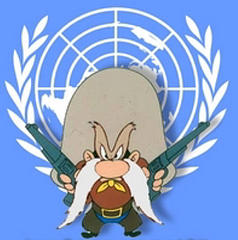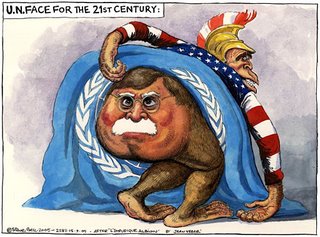A True Assessment

The picture of Iraq, as a whole, can be seen through a report published by the Washington Post (Dafna Linzer and Thomas E. Ricks Nov. 28th 2007):
The U.S. military is no longer able to defeat a bloody insurgency in western Iraq or counter al-Qaeda's rising popularity there, according to newly disclosed details from a classified Marine Corps intelligence report that set off debate in recent months about the military's mission in Anbar province.
The Marines recently filed an updated version of that assessment that stood by its conclusions and stated that, as of mid-November, the problems in troubled Anbar province have not improved, a senior U.S. intelligence official said yesterday. "The fundamental questions of lack of control, growth of the insurgency and criminality" remain the same, the official said.
The Marines' August memo, a copy of which was shared with The Washington Post, is far bleaker than some officials suggested when they described it in late summer. The report describes Iraq's Sunni minority as "embroiled in a daily fight for survival," fearful of "pogroms" by the Shiite majority and increasingly dependent on al-Qaeda in Iraq as its only hope against growing Iranian dominance across the capital.
True or not, the memo says, "from the Sunni perspective, their greatest fears have been realized: Iran controls Baghdad and Anbaris have been marginalized." Moreover, most Sunnis now believe it would be unwise to count on or help U.S. forces because they are seen as likely to leave the country before imposing stability.
Between al-Qaeda's violence, Iran's influence and an expected U.S. drawdown, "the social and political situation has deteriorated to a point" that U.S. and Iraqi troops "are no longer capable of militarily defeating the insurgency in al-Anbar," the assessment found. In Anbar province alone, at least 90 U.S. troops have died since Sept. 1. The Post first reported on the memo's existence in September, as it was being circulated among military and national security officials. Several officials who read the report described its conclusions as grim.
But the contents have not previously been made public. Read as a complete assessment, it paints a stark portrait of a failed province and of the country's Sunnis -- once dominant under Saddam Hussein -- now desperate, fearful and impoverished. They have been increasingly abandoned by religious and political leaders who have fled to neighboring countries, and other leaders have been assassinated. And unlike Iraq's Shiite majority, or Kurdish groups in the north, the Sunnis are without oil and other natural resources. The report notes that illicit oil trading is providing millions of dollars to al-Qaeda while "official profits appear to feed Shiite cronyism in Baghdad."
As a result, "the potential for economic revival appears to be nonexistent" in Anbar, the report says. The Iraqi government, dominated by Iranian-backed Shiites, has not paid salaries for Anbar officials and Iraqi forces stationed there. Anbar's resources and its ability to impose order are depicted as limited at best. "Despite the success of the December elections, nearly all government institutions from the village to provincial levels have disintegrated or have been thoroughly corrupted and infiltrated by Al Qaeda in Iraq," or a smattering of other insurgent groups, the report says.
The five-page report -- written by Col. Peter Devlin, a senior and seasoned military intelligence officer with the Marine Expeditionary Force -- is marked secret, for dissemination to U.S. and allied troops in Iraq only. It does not appear to have been made available to Iraqi national forces fighting alongside Americans.
The report, "State of the Insurgency in Al-Anbar," focuses on conditions in the province that is home to 1.25 million Iraqis, most of whom live in violence-ridden towns such as Fallujah, Haditha, Hit, Qaim and Ramadi.
Devlin wrote that attacks on civilians rose 57 percent between February and August of this year. "Although it is likely that attack levels have peaked, the steady rise in attacks from mid-2003 to 2006 indicates a clear failure to defeat the insurgency in al-Anbar."
Devlin suggested that without the deployment of an additional U.S. military division -- 15,000 to 20,000 troops -- plus billions of dollars in aid to the province, "there is nothing" U.S. troops "can do to influence" the insurgency.
He described al-Qaeda in Iraq as the "dominate organization of influence in al-Anbar," surpassing all other groups, the Iraqi government and U.S. troops "in its ability to control the day-to-day life of the average Sunni."
Al-Qaeda itself, now an "integral part of the social fabric of western Iraq," has become so entrenched, autonomous and financially independent that U.S. forces no longer have the option "for a decapitating strike that would cripple the organization," the report says. That is why, it says, the death of al-Qaeda in Iraq leader Abu Musab al-Zarqawi in June "had so little impact on the structure and capabilities of al-Qaeda," especially in Anbar province.
The senior intelligence official, who spoke on the condition of anonymity because of the sensitivity of his work, said yesterday that he largely agrees with Devlin's assessment, except that he thinks it overstates the role of al-Qaeda in the province. "We argue that it is a major element in Anbar, but it is not the largest or most dominant group," he said.
In a final section of the report, titled "Way Ahead," Devlin outlined several possibilities for bringing stability to the area, including establishing a Sunni state in Anbar, creating a local paramilitary force to protect Sunnis and to offset Iranian influence, shifting local budget controls, and strengthening a committed Iraqi police force that has "proven remarkably resilient in most areas."
Devlin ended the assessment by saying that while violence has surged, the presence of U.S. troops in Anbar has had "a real suppressive effect on the insurgency." He said the suffering of "Anbar's citizens undoubtedly would be far worse now if it was not for the very effective efforts" of U.S. forces.
The Marine Corps headquarters had no comment on the August report or the updated assessment, Lt. Col. Scott J. Fazekas, a spokesman, said yesterday.








